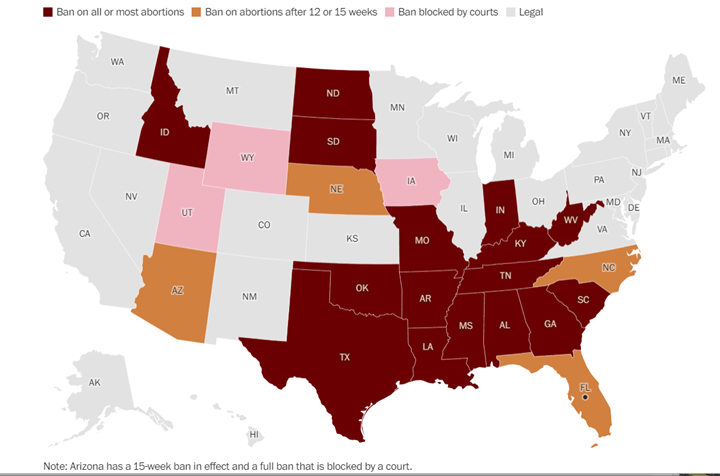NOTE: Protest Tuesday, March 26, 2024, in Sherman at noon.
Less than two years after the Supreme Court overturned Roe v. Wade, the issue of reproductive rights is returning to the high court on Tuesday, March 26, 2024, as the justices consider whether to limit access to a medication used as part of a two-drug regimen in more than 60 percent of U.S. abortions.
The Biden administration and the manufacturer of mifepristone are seeking to reverse a lower court ruling that would make it more difficult to obtain the medication, first approved nearly 25 years ago and shown in multiple studies to be overwhelmingly safe.
The conservative U.S. Court of Appeals for the 5th Circuit said the Food and Drug Administration failed to follow proper procedures and thoroughly explain its reasoning when it began loosening regulations. The changes made in 2016 and again in 2021 allowed mifepristone to be taken up to 10 weeks into pregnancy, instead of seven weeks, prescribed by a medical professional other than a doctor, and mailed directly to patients without an in-person medical consultation.
The pharmaceutical industry has warned that second-guessing FDA’s determinations in this case will more broadly disrupt the nation’s drug-approval process and stymie private investments in research. A decision should come by the end of June or early July, putting abortion front and center as Democrats campaign on the issue in the 2024 election.
The case could make it harder to get medication abortions even in states where abortion is legal. Allowing medication abortions to proceed without an ultrasound or in-person medical visit has increased access, particularly for women in rural areas and others who struggle to go to a clinic in person, by allowing them to complete the entire process from home.
The Supreme Court could also further impede abortion access for those living in one of the more than a dozen states with strict abortion bans in place. A few telemedicine clinics have started allowing U.S.-based doctors to prescribe and mail pills into restricted states, relying on new “shield laws” passed in several blue states to protect them from prosecution. The largest of these clinics, Aid Access, now mails approximately 6,000 doses of medication abortion into antiabortion states every month, according to founder Rebecca Gomperts.
Many abortion rights advocates say they will continue to send abortion pills through the mail no matter how the Supreme Court rules. Some are ready to switch to a misoprostol-only protocol, a method of medication abortion that uses only the second drug in the current two-step regimen. That option is also highly effective, but causes significantly more cramping and bleeding.
A narrowed time window for accessing abortion pills would have major implications nationwide. In 2021, 56 percent of all abortions occurred beyond seven weeks of pregnancy. Just 20 percent occurred after 10 weeks, the FDA’s current mifepristone limit.
For the FDA and the pharmaceutical industry, the legal battle over mifepristone casts a shadow over all drugs, medical devices and diagnostics that the agency approves. If the 5th Circuit’s decision is upheld, industry and former government officials say, it would undercut the FDA’s stature as the global gold standard of regulating medicine – as well as the ability of drugmakers to raise money from investors. That, in turn, could deprive patients of innovative therapies.
Two-thirds of Americans said that mifepristone should remain on the market, according to a Washington Post-ABC News poll in May 2023. GOP leaders, meanwhile, have continued to stake out opposition to the medication. A proposal released last week by the Republican Study Committee, an influential congressional caucus that represents most House Republicans, called for rolling back access to mifepristone. Conservative policy groups such as the Heritage Foundation have also said that former president and current GOP candidate Donald Trump should use executive authority to crack down on the drug if he is elected again.
Many antiabortion advocates have instead pinned their hopes on changing the culture around abortion pills – hoping to make women skeptical of obtaining the pills through the mail without an ultrasound or a doctor’s visit, even though studies show it is overwhelmingly safe to do so.
A Supreme Court ruling that compels the FDA to reinstate old restrictions would be an important step toward changing how the pills are perceived, antiabortion advocates said.
A large body of research shows mifepristone is safe and effective. The FDA points to published studies of tens of thousands of women showing that serious adverse events after mifepristone use occurs in fewer than 1 percent of cases.
https://www.washingtonpost.com/politics/2022/06/24/abortion-state-laws-criminalization-roe


